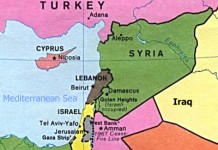Context
 President Obama’s Middle East policy speech on Thursday has drawn mixed responses from people and governments across the region. Some Arab commentators view the president’s promise of supporting the blossoming democracies in Tunisia and Egypt as well as the efforts he had made to impose sanctions on Syria’s President Bashar Assad as a positive change in American foreign policy. Others, however, believe that his address reflected the same old approach of backing a favored ruler until it becomes obvious that he is losing control. As far as Obama’s call for a negotiated peace solution based on the 1967 borders is concerned, the proposal was rejected by Israel while the Palestinian leadership said it would hold talks to discuss the American president’s policy speech.
President Obama’s Middle East policy speech on Thursday has drawn mixed responses from people and governments across the region. Some Arab commentators view the president’s promise of supporting the blossoming democracies in Tunisia and Egypt as well as the efforts he had made to impose sanctions on Syria’s President Bashar Assad as a positive change in American foreign policy. Others, however, believe that his address reflected the same old approach of backing a favored ruler until it becomes obvious that he is losing control. As far as Obama’s call for a negotiated peace solution based on the 1967 borders is concerned, the proposal was rejected by Israel while the Palestinian leadership said it would hold talks to discuss the American president’s policy speech.



